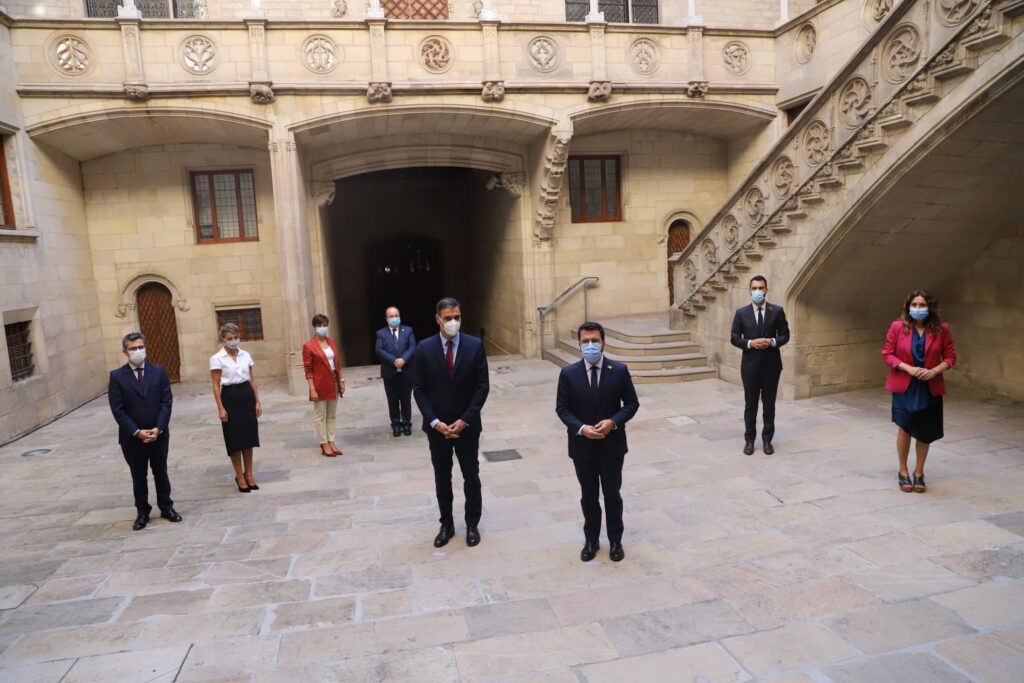16.09.2021 - 08:40
|
Actualització: 16.09.2021 - 10:40
Dialogue is the only way forward: this is the main, and perhaps only, point of agreement between the Catalan and Spanish governments after a meeting in Barcelona on Wednesday. After years of political confrontation, a compromise still seems a long way off: Catalan officials want a self-determination referendum and an amnesty for all people facing charges related to the ongoing independence push, but the Spanish government rejects talking about these demands.
On top, both sides agreed to not set any deadlines for the talks—a decision contrasting with the two-year grace period given to Catalonia’s leading Esquerra party by some of its pro-independence allies. “More than specific deadlines, which we don’t set, the most important thing is specific agreements and progress,” said on Wednesday afternoon Pere Aragonès, the head of the Catalan government.
Aragonès’ Esquerra party, which is the largest pro-independence force in parliament, defends the need to engage in dialogue with Spain. However, their main political allies and junior coalition partners, Junts per Catalunya, believe that any efforts to negotiate with Spain will bear no fruits.
Gain time
Spain’s president Pedro Sánchez, who traveled to Barcelona to attend the first meeting but will not participate in future talks, stressed that the so-called negotiating table “is the best way” to address the ongoing dispute. “If we really want it to be true dialogue and we are serious about resolving the underlying conflict, we will need time,” said Sánchez.
Sánchez and Aragonès held the first meeting at 3 pm, which lasted two hours, and the two delegations comprising ministers from both governments subsequently gathered for another two hours. The Catalan delegation was formed by presidency minister, Laura Vilagrà, and business minister, Roger Torrent. On the Spanish side, presidency minister, Félix Bolaños; territorial policy minister, Isabel Rodríguez; culture minister, Miquel Iceta; and second vice president, Yolanda Díaz, will attend.
Shortly after the meeting with the Spanish president, Aragonès said to the press that both sides have come “from very different starting points” and avoided setting deadlines for the talks. According to him, a “new phase in the political conflict between Catalonia and Spain” has begun. “What Catalan society asked for – Spain, sit and talk – is now happening.”
The head of Catalonia’s cabinet also brought up the independence camp’s proposed solution to the conflict: “I stressed the need for a referendum on independence as it is the most inclusive option.” He argued that it “allows everyone to defend their position.” “This is what Scotland was able to do and will likely do again,” he added.
Radically different positions
After his meeting, Sánchez also talked to the press confirming that his position was “radically different from that of the Catalan government,” but added that both leaders agreed that dialogue is the way forward.
“We have decided to continue working together unhurriedly but at a steady pace with no deadlines,” Sánchez told the press. His term will end by November 2023 and Esquerra, Aragonès’ party, agreed with CUP, key for a pro-independence majority in the chamber, to determine whether there was any point in continuing the talks in 2023.
Sánchez confirmed that Aragonès once again called for a referendum on independence, something that did not receive a positive answer: “We live together and need to decide together. Anything that affects Spain must be decided amongst all Spaniards,” Sánchez told the media.
Self-determination vs. reconciliation
In the end, Catalonia was only represented by ministers of the Esquerra party, the senior coalition partner, after President Aragonès rejected its junior partner Junts’ request to send politicians who are not cabinet members. Junts announced it would not send anyone else and would, therefore, not take part in Wednesday’s meeting.
The ultimate aim of the delegation led by Aragonès is unitary: a Scotland-like referendum on independence that is accepted by Spain and an amnesty for everyone facing judicial procedures for the independence push in the 2010s, including the return of former president Carles Puigdemont from exile.
As for the government in Madrid, they would like to discuss the “reconciliation” between Catalonia and Spain. Minister Miquel Iceta, the former head of the Catalan Socialist party, said on Monday that if the negotiations revolve exclusively around a referendum and an amnesty, “they will be short and unsuccessful.”


